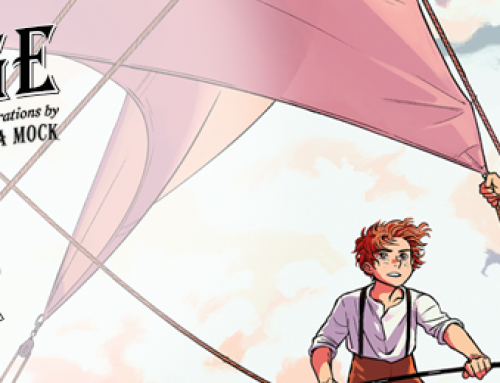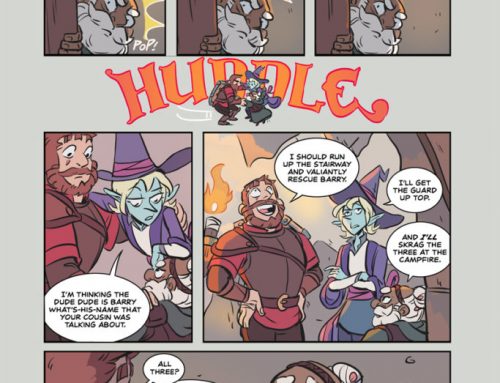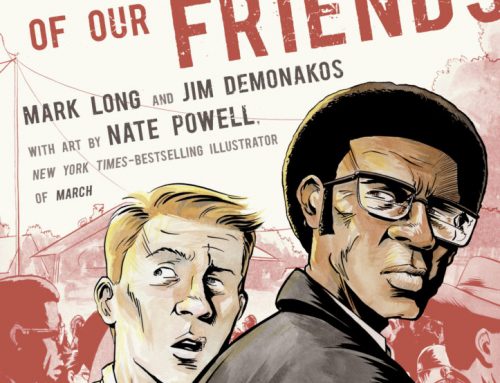test heading
Apparently, MySpace has made American Born Chinese a featured book… Not all good news, though, since it seems to come with a rather tasteless ad campaign that uses the Chin-Kee character out of context, and has led to all kinds of discussions among people who haven’t read the book. Gene Yang responds.
Does acknowledging a stereotype perpetuate it?
I first published American Born Chinese as a series of mini-comics and a webcomic. The readership was much, much smaller than that of the graphic novel, but occasionally I’d still receive e-mail giving me feedback on my work. Every now and then, I’d get one that would make me question everything. “That Chin-Kee story was hilarious!” it would tell me.
Cousin Chin-Kee isn’t meant to be funny. He’s meant to come off the page and slap you in the face. If you’re laughing at him, I want you to do so with a knot in your stomach and a dry throat.
For every ignorant piece of feedback, I’d get a dozen more that were with me, that understood where I was going and wanted to follow. These e-mails felt my anger seething beneath Cousin Chin-Kee’s toothy smile.
These e-mails convinced me to carry on.
To those of you who are offended by every third chapter of American Born Chinese, I say this: Thank you. You’re supposed to be offended. That was the desired response.
You see, Cousin Chin-Kee is no more my creation than the Monkey King. I yanked him, every last detail about him, straight out of American pop culture. One of his most over-the-top lines is a word-for-word quotation from a political cartoon by an
award-winning, nationally-syndicated cartoonist. In a lunchroom scene in the sixth chapter of American Born Chinese, Cousin Chin-Kee offers Danny a bite of his “crispy fried cat gizzards with noodles.” On April 9, 2001, in response to the Chinese spy plane crisis, American political cartoonist Pat Oliphant drew a six panel strip depicting Uncle Sam’s visit to a Chinese restaurant, where he is served “crispy fried cat gizzards with noodles” by a slant-eyed, bucktoothed waiter. Outside of a few angry Asian-American columnists writing for small Asian-American audiences, the entire matter slipped out of public consciousness without so much as an embarrassed blush of the cheek from Oliphant.
Cousin Chin-Kee just keeps coming back to visit. In the 80’s, he showed up as Long Duk Dong in Sixteen Candles. More recently, he reared his ugly head in movie critic Rex Reed’s review of the Korean film Old Boy. When the American public caught a glimpse of him in William Hung’s American Idol performance, Hung was promptly made the most recognizable Asian-American male in the world. Every time Asian America thinks it’s finally time to breathe easy, the doorbell rings and we find Cousin Chin-Kee on the doorstep with a piece of take-out box luggage in each hand.
America simply isn’t sensitive to modern slurs against Asian-Americans. As a nation we know that Fu Manchu isn’t politically correct, of course, but what’s so bad about making fun of someone for switching up her R’s and L’s? We don’t connect modern incidents of “poking fun” at Asian-Americans with their historical roots, with the kind of late 19th/early 20th century imagery that accompanied the Chinese Exclusion Act of 1882 and the World War II Japanese-American internment camps.
The fact of the matter is, sometimes you have to exaggerate to get your point across. Sometimes a stereotype needs to be dressed up in bright yellow skin and a queue in order for folks to recognize its severity.
So does acknowledging a stereotype perpetuate it? There certainly is that danger. But there’s also the danger of brushing off stereotypes with a polite grin and downward glance. And given Asian America’s historical lack of political participation, which is the greater danger? After all, if I hadn’t invited Cousin Chin-Kee – this grotesque creation of Sax Rohmer and John Hughes, of Pat Oliphant and my second grade classmates – into the pages of my comic book, if I hadn’t pointed him out and called him by name, I would never have been able to behead him.





Even if you are the only one who wants to save your troubled marriage you can do it alone once you know what you need to do. So, relax, take a deep breath and let’s get started with some things you can do to get started on saving a troubled marriage.
it’s nice blog….. i like it..
pleased to meet your blog…
please VISIT ME…OK…thank u very much
I think American Born Chinese was a great book. It was full of great comedy and stereotypes.
To Alex, teaching in Hawaii – there is racism in Hawaii, believe me. I lived there for almost 30 years. But it’s different from what most Mainlanders have experienced. As a mixed-race kid, I thought moving to Hawaii was going to get rid of all my troubles. Hah! Being hapa-haole (half Caucasian) was a problem, this time for being White! Oh yes. I got into trouble for being half Japanese while living on the Mainland, and then faced trouble for being half White in Hawaii. I felt I couldn’t win for losing. I did end up blending in, I went as “local” as I could, picked up pidgin. When kids yelled out “hey, haole girl!” I yelled right back “nah, I’m hapa-haole!” “what you, den?” “Japanese.” “oh, okay den.” And then it was okay. Since I look more haole anyway, with fair skin and freckles, people actually started asking me if I was “Portagee.” Being Portuguese in Hawaii is not White. And I ended up feeling much more comfortable racewise in Hawaii than anywhere else, but it took years.
My Japanese sister-in-law waited 10 years to marry her Filipino boyfriend, it took that long for some members of the family to accept him. Hey, it took them 3 years to get used to me, the hapa-haole girl. When my husband’s grandmother first saw me, she yelled back into the house, “there’s one haole girl out here!” But, 3 years later, she did all the flowers for our wedding.
And as far as I know, the Tongans still hate the Samoans and get into fights … the inter-racial gang fights were legendary when I was in high school. But all the locals and Asian Pacific Islanders would team up to beat up the haoles, my brother and his friends got caught up in one of those situations. So yeah, racism is there in Hawaii.
I’m a middle school English teacher at a public school in Hawaii. I grew up in New York, am white, and came out here to teach four years ago.
I went from upstate (WAY upstate) New York, which is almost all white people, to a place where white people are called “haoles” and are in the minority. I haven’t experienced any racism, here, though.
What really amazed me about your book is that I had never, never though about Asian stereotypes at all. The Chin-kee character made me feel horrible, like seeing a person in blackface and suddenly being struck by your own racist perceptions like a ton of bricks. My classroom is probably about 75% Asian or Pacific Islander. Many of my friends are Japanese, Korean, Chinese, or Filipino, or some mix thereof. And still, Asian steotypes were completely invisible to me. . .until now.
As a Christian, I am so glad you wrote this book. As a middle school teacher with a ton of Asian students but absolutely no clue into the lives of Asian kids, I’m so glad you wrote this book. I will be buying a couple of copies of it for my classroom library, and I’m sure a lot of kids’ lives are going to be affected by it.
Seriously. . .the book just blew me away.
Gene, I can’t thank you enough. The ideas you have shared here are really quite thought-provoking. Both your article and comments have generated some great discussions in my classroom. I look forward to including excerpts from American Born Chinese and the above article in my future lessons on satire.
My students and I thank you for sharing your time and thoughts. We wish you the best.
Hey Kevin,
You sound like an awesome teacher.
I definitely think the identity of the writer affects the satire. I think it’s much trickier to satirize a subject in which you have no direct investment. It can come off as mean-spirited and insincere. I think having some sort of direct investment allows you to go the mile in polemic, to exaggerate beyond common decency, and still keep a kernel of humanity behind your words. That’s how I see it, anyway. Not to say that you can write about people groups that don’t include you. Swift, for instance, wrote about the poor and he wasn’t. But he was clearly included in his essay, as it was directed squarely at members of his own socio-economic class.
As for the difference between satire and making fun, I don’t know… I don’t think the line is definite. Maybe they’re just two ways of describing the same thing? Maybe kids make fun, but adults satirize… :)
Gene
Gene, that sounds like an exciting piece of satire inspired by Jonathan Swift. As a follow-up: My students and I conducted a lengthy discussion (40 minutes!) on your comments about American Born Chinese and stereotypes. We would be extremely grateful to pick your brain on the following questions.
1. Do you think a satirical writer’s personal race/gender/religion affects his or her piece of writing? For instance, would American Born Chinese have the same satirical value if an African American had written it?
2. Is there a definite line between satire and just plain making fun?
Gene, I would appreciate any time you spent on this. Thank you so much.
Also, my self-published comic, STATES, deals with somewhat similar race issues if anyone wants to check it out. You can find it here: statescomic.blogspot.com
As an ABHC (American Born Half-Chinese), I distinctly remember being 7 years old and gleefully reciting a poem I learned earlier that day to my Shanhai-born mother: “Me Chinese, Me play joke, Me make pee-pee in your Coke.” About 7 seconds later, my mother’s head popped off her shoulders.
Stereotypes are funny things… they often come from someplace, don’t they? My mother’s lived in the U.S. for over 50 years, but her accent is still thick at times. She can’t pronounce our cat Esmerelda’s name if you gave her a million dollars. Likewise, if you walk through the streets of Beijing right now, you WILL see many, many short, elderly folk with bad teeth wearing Mao jackets. The stature and teeth come from several generations of malnutrition due to WWII and the Cultural Revolution. The Mao jackets come from old habits that are hard to break.
On the other hand, when I walked with my 6 foot tall father through the streets of Beijing, over and over I heard the same phrase being whispered from passerbys and curious onlookers. I don’t remember he actual Chinese, but my mother told me that it translated to “Big Hulk.” Europeans, you see, are massive, pale skinned brutes with no taste but big wallets.
My reaction to Chin Kee’s stereotypical characterization was mild compared to my discomfort from his cousin Danny’s revulsion. I knew several people like Chin Kee in my day either from my family or from kids my mother forced me to play with. But I identified with Danny, because that’s who I imagined myself to be when I was that age. As it turns out, Mr. Yang’s brilliant book revealed to me how much like Danny I really was. Am?
I’m not convinced my mother was right to be so upset with me when I told her that poem. I was only seven after all, and I was celebrating the “pee-pee” more than anything else. But years later, I’ve come to wonder… if all of my friends back then were White — and they were — which one of them thought it would be a good idea to teach me that poem?
It is impossible to bring up the topic of racism without bringing up stereotypes. The issue is not whether bringing it up gives it more power, but rather whether we are going to let stereotypes and racism have the last word.
Thank you all for your responses! Kevin, you sound like you’re doing really exciting things in your English class. When I was a senior in high school, we studied “A Modest Proposal” in English. That unit had a lasting effect on me. In fact, I actually wrote my response paper to that unit about Asian-Americans. I think my thesis was about how Asians aren’t quite human, and needed to be treated as such… something like that. It was my first time experimenting with satire. I really need to track down my English teacher and thank her.
Sorry to hear that Chin-kee has been taken out of context and co-opted.
If it’s any consolation, Bill Watterson couldn’t get Calvin to stop urinating in public.
Of course, just recently the stereotypical image of the Asian male has just changed from Chin-Kee to taciturn “model minority” student as ticking time-bomb.
>sigh< The task of breaking down stereotypes will never be done. BTW, as an ABC myself, I enjoyed the book and it echoed some of my psonal experience.
I’m half Japanese (my mother is Japanese). I “got” the Chin-Kee characterization – he’s supposed to be offensive, just as all those stereotypically bad Japanese soldiers in all those WWII comics and movies were highly offensive to me. I think American Born Chinese is genius work, to bring out those stereotypes, to show how some of us were made to feel we’re not good enough because we’re not Caucasian. In my case, because I’m mixed race, I got it from Japanese in Japan (they looked at me as though I was a freak – pretty damned hard to take when you’re only 7 years old) AND in the U.S. from Caucasians. See, when you look at me you’ll see a short, round, dark brown-haired (now liberally sprinkled with gray) woman with pale, freckled skin. I LOOK Caucasian, but I’m not completely so. And when I lived in the Pacific Northwest (where in the early 20th century the whites hated the Japanese for daring to be good farmers), they really didn’t like me for “passing” for white when I’m not. Never mind I never tried that, I was (and am) proud of my Japanese heritage. Then, decades later, in Indiana, a co-worker actually told me I should shut up about being mixed-race and go along with being considered white. And an African American caregiver told my mixed race younger son he was white because he had no African blood in him; he was 4 years old and told my Japanese American husband and me that he must be white because his “teacher” told him so and kept denying that he is mixed race and mostly Japanese. Racism is alive and well and everywhere. If we who are of Asian ancestry don’t speak up for ourselves, who will?
I love American Born Chinese precisely because of Chin-Kee and Gene’s work to explode stereotypes in his book.
Wow, Gene. That really hit home.
I’m in my third year teaching High School English in Paterson, New Jersey. My seniors and I just got finished reading some satirical pieces, such as “A Modest Proposal” and “Candide”. I just printed out your comments, and intend to bring them into class tomorrow. You’ve raised some interesting points I think will make for good classroom discussion. Though I’ve been hearing about your work a lot lately, I’ve yet to pick it up. I will surely do so now. Thanks for sharing your mind.
how can you go on myspace.com if everything in your whole school is blocked. Is there some kind of web site that can’t be blocked? That can still get you on myspace.com?